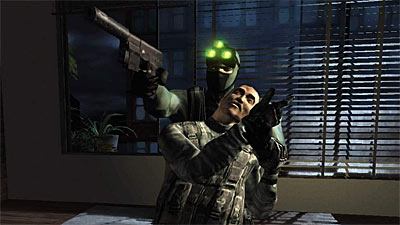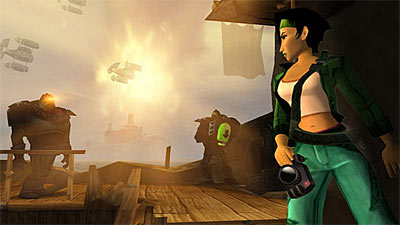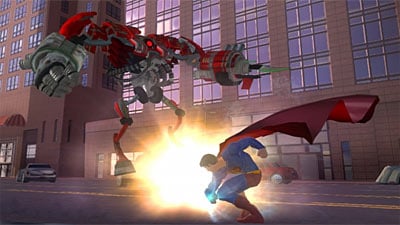Are video games becoming too realistic?

Games are more realistic now than they’ve ever been. With new gaming engines coming out like Euphoria which simulates human skeletal structuring to create realistic reaction to stimuli, games are going to be more lifelike than ever before. However, games have always been a form of escapism, a way to take a break from reality to visit a world of fantasy. The best games make us forget ourselves, our surroundings, our troubles, and our jobs for the time that we’re engulfed in the gameplay. But does it take realism to do this? If a game becomes too realistic, do we lose that element of escapism, or is it simply intensified? The question that we’re asking this week at CCC is “Are our games becoming too realistic?”
D’Marcus Beatty, Co-Site Director
Video games are a form of escapism, a way for us as gamers to become so absorbed in another simulated environment. In some respects, realism in our games is essential. In other ways, realism would ruin the game. Consider how many games really allow death after being hit by one bullet. Even in games like Halo, where the player can be put out of commission by a simple headshot, the players still run around after being shot multiple times and can usually heal themselves by staying out of fire for a few moments or by simply running over a health kit (Not applying any medicine or bandages, just running over the kit). Being too real wouldn’t be fun at all, since most people would be incapacitated after being shot by a single bullet, which would make persevering until the end of Grand Theft Auto, Saints Row, Halo, or Splinter Cell simply impossible.
Tempered reality makes a game more immersive, but too much reality can ruin a game. After all, the best movies and books and television shows are usually filled with fantastic situations and improbable occurrences to keep the audiences and fans entertained. The best games are those that give us enough reality to allow us to relate, then give us enough fantasy to entertain us indefinitely.

Maria Montoro, Co-Site Director
After Nintendo decided for us, Wii gamers, that realism in video games is not important anymore, one has to wonder: are they right or are they trying to fool us? Nintendo certainly didn’t go for realistic graphics this time around, unlike Sony and Microsoft which fell deep into the game-realism “abyss.” I really appreciate great-looking graphics, but realism is not all for me. It’s important to remember that most video games are about fantasy, about submerging yourself into an adventure that you can’t have in real life. If they make the characters look like real life actors and the story and situations in which one gets involved sound too real, where is the fun?
For example, one of my favorite games of all time, Beyond Good & Evil, would have never been as engaging if it was focused on realism. That game sported beautiful graphics – they were sharp, colorful, and defined; at the same time, one of the characters was a talking-pig, who was the main character’s uncle. For some reason, the main character was a human with great facial features and the coolest green eyes. They were investigating a possible conspiracy of robots and other alien creatures. They were trying to save their world, Hillys. And all of this happens in the year 2435. If they had made the game look too realistic, I wouldn’t have believed in it. I know it sounds like a contradiction but it’s true, sometimes you have to let the charm of fantasy and imagination take over instead of trying to deliver the most true-to-life graphics ever created and not paying attention to the actual game’s needs.
Are realistic graphics dangerous in video games? Will they change children’s mentalities and make them heartless humans? Will the next generation of humans become careless and reckless? That all depends, one more time, on the type of movies and video game consumption they’re subject to. If kids are controlled by their parents and only play the appropriate games for their age, everything should be fine. People underage shouldn’t be allowed to watch or play certain things on a regular basis. However, adults have watched all sorts of movies for years; the fact that movies are more realistic hasn’t changed them that much. Sure, playing Punch Out won’t have the same effect as playing Fight Night Round 3, but grown-ups should be able to discern between reality and video games, and I think most of us will.
Realistic graphics are not morally worrisome, in my opinion. However, they worry me in the sense that the quality of the gameplay is being reduced by paying more attention to the visuals when the game is being developed. Look at MotorStorm, for example. The game has the most gorgeous graphics ever seen, but the gameplay leaves you wanting for more. Oh, well; time will bring a good balance, I hope.

Jonathan Marx, Freelance Writer
Whether it is for good or ill, realism in gaming is here to stay. Ever since Mr. Roddenberry devised the idea of a Holo-Deck on the starship Enterprise we have been fascinated by the idea of creating alternate realities and being able to participate in them. Eventually, video gaming will go that route. Virtual reality gaming will be the mainstay for the industry in the future. There will always be a niche for simple gaming and cartoon styling. However, the closer we get to recreating reality, the closer we get to the ultimate form of escapism. Puzzle games and side scrolling, cartoon platformers are really fun but they don’t truly engage us as do pseudo-realistic worlds that allow us to play out our fantasies. That’s why we’ve seen the overwhelming success of games such as GTA.
Over the past two decades, gaming companies have strived to make their games more graphically realistic because the modern gamer demands crisp visuals and high production values. Additionally, if their games closely mimic real-life, no matter the era or the setting, the player can lose themselves and will shell out big bucks for that experience. If a gamer can interact with a world that is, for all intents and purposes, the same as their own except for a few important factors, then it actually becomes more engaging and more credible to the player. If the only differences between the game’s virtual world and the player’s living world are that the player can fly, or be a gangster, or score a hat-trick night in and night out, then the game has succeeding in providing that gamer with a very rewarding experience. This is escapism, and the trend toward this end will continue until we have realized Gene’s Holo-Deck.

Matthew Walker, Freelance Writer
Are games becoming too realistic? According to certain political figures, the answer is yes. However, you have to ask yourself one thing. Why do I play video games? We all know the answer to that question. Escapism, relaxation, and because they are fun, are but a few relatively common answers I would assume.
Dating as far back the inception of video games, we have been playing games for a brief escape from the reality around us. From the flat cubicle Mushroom Kingdom to the vast forests of Hyrule, they are where we went to become the hero and save the day. Much like how comic books are often used to escape reality, where all of us have thought about being Superman if for just one day.
I think that over the years with the improved graphics it has become both easier and more difficult to discern from reality the way we might want to. This not to say that when we were younger we did not have an equally hard time separating reality from fiction; it happens all the time. On some levels, I think that the new paths towards improving games are great, with characters mimicking human traits without player involvement. These advancements are astounding and further enhance the gaming experienced. They are definitely a far cry from the cardboard cutouts that acted more like rusty robots than your enemies.

Therein lays the problem, however. Higher levels of scrutiny are sure to surround the gaming industry in the coming months, thanks in large part to GTA IV. If all of our games delve deeper into the blurred lines of reality, then we might be facing stricter rating system just for depicting realistic aspects in the games. Who among us could tolerate the next Mickey Mouse game getting a Mature rating due the realism in that particular game?
Read on! There’s more on the next page!
